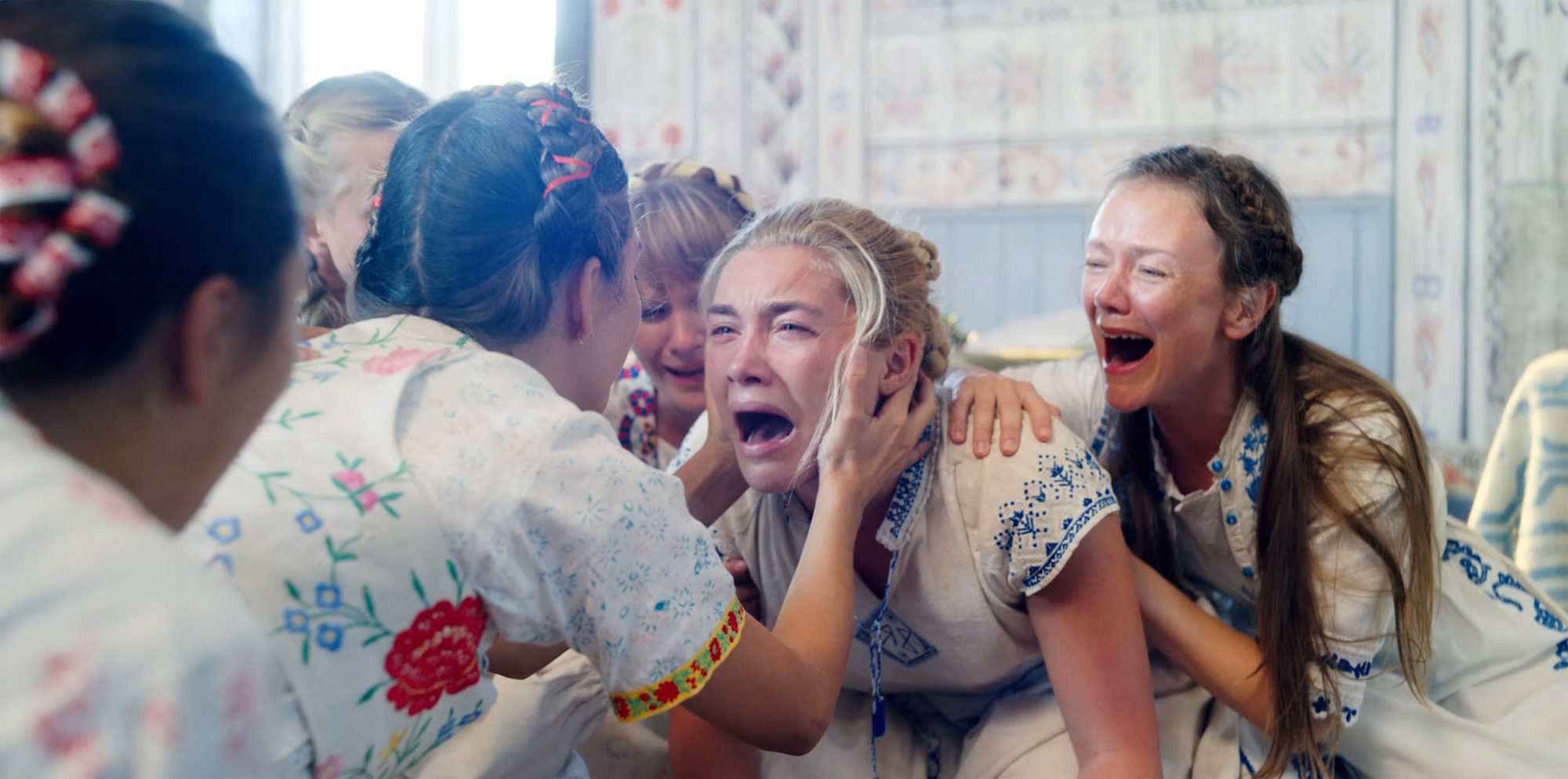Midsommar, Ari Aster’s magnum opus follow-up to his deeply unsettling Hereditary, is a sophomore picture of command and precision, well-directed and frequently diverting in its tale of unsuspecting American collegiates venturing into a once-a-century celebration of pagan depravity.
Yet as movie freak outs go, Midsommar—unlike its predecessor—offers predictable, diminishing returns as it plods along, managing minimal substance over a trying 140 minutes. While Aster’s accomplished aesthetic and vision are indisputable and always visually engaging, the picture struggles to maintain a significant raison d’être and upon conclusion, its meaning is both unclear and unsatisfying. And in the shadow of its smaller budget yet bigger league predecessor, one of the great horror films, it’s a bit of a come down.
The talented Florence Pugh (Lady Macbeth) is college student Dani, whose life is upended after her beloved sister and parents are found dead. Her already tenuous relationship with her vacuous boyfriend, the symbolically named Christian (Jack Reynor), is further strained, his intended breakup suddenly derailed. It’s soon clear he’s a wastrel, unworthy of her attentions—but what will it take for Dani to see so?
While his brighter bro Josh (William Jackson Harper) and comic foil Mark (Will Poulter) encourage him to drop the hammer, Christian surprises in suggesting Dani tag along on their guys trip to Sweden. Why Sweden? Resident Swede and buddy Pelle (Vilhelm Blomgren) has invited his friends to meet his “family,” a merry commune of pagans holding a festive summer retreat that only happens every 90 years, and just so happens to dovetail with the guys’ anthropology studies, specifically Josh’s thesis on ancient communities. So far, so good.
Picture segues to a clearing in the Swedish countryside and its seemingly benevolent host community, a serene embrace and comforting antidote for Dani. In pitch perfect visuals, Aster depicts a utopian world of peaceful, flowing white robes and crowns made of flowers and leaves, coquettishly teasing flirtations and communal dinners (which include mysteriously potent drinks) and sleep quarters and an oddly triangular building, the purpose of which will only later become clear. It’s all very charming in its oddness—until it isn’t.
Pelle quickly warms to Dani. But why? Is he interested in her romantically? Or is there an ulterior motive? And what’s with the photo collection of young women crowned festival “May Queen”? Why do the meat pies taste so conspicuous? Is that pubic hair making an appearance in someone’s lunch? And to where do friends keep disappearing? Why doesn’t anyone acknowledge a captive bear? Or a strangely explicit courtship mural? And why are the women fixated on Christian? Why can we see everything coming long before they do?
That last question is a problem in Midsommar, which works hard to cover its thin characters and logic lapses (why, exactly, does everyone stick around when their friends are disappearing left and right?) with a climax of copious nudity and gore, and largely hinges on decisions that will influence the outcome of the central relationship, albeit in an outrageous context.
It’s clear to us from the get-go that Christian has nothing going on upstairs and isn’t loyal—so why does it take Dani so long to see it? This and other predictabilities—including overt nods to better horror films like 1973’s British shocker The Wicker Man—drive this movie to a conclusion we can see coming two hours prior. We suspect what will happen—and it does.
Pugh, who showed fire in 2016’s Lady Macbeth, heart in this year’s Fighting with my Family and will be seen later this year in Greta Gerwig’s Little Women, is a most sympathetic character here, wounded to the core and who eventually regains equilibrium and sense, even fury, by the picture’s end. But it that enough to make this long-winded, mind-fuck exercise substantive? In my view, not quite, given that the picture’s dual themes of female empowerment, or enshrinement, and emasculating revenge (or as I saw it, how to really lose a guy in nine days) are telegraphed very early then executed in lockstep.
Midsommar, about barbarism lurking in the hearts of benevolent people and bloody retribution for our transgressors, in its own way, fancies itself a distant cousin to Kubrick’s epic The Shining, suggesting a centuries-old evil as an inescapable, enveloping force. And to Aster’s credit, he superbly uses Europe’s midnight sun to depict encroaching horror in the cold light of day; nothing is bumping in the night here and the picture leans into atmosphere and gore at the expense of tension. Even as initially disturbing scene that bumps in the daylight—featuring two aged community members being retired—becomes a visceral shock repeated several times in close-up.
Like Hereditary, Midsommar’s denouement involves sagging, naked bodies, clandestine rituals, sacrifices and spiritual corruption. Yet unlike that picture, with its potent personal drama and examination of how grief and guilt splinter a family courtesy of a rich performance from Toni Collette, the picture achieves little depth on which to hang its thrills; consequently, the effect of its jolts is mere novelty.
Midsommar is a tale that takes a long time to get where it’s going, and one of sound and fury signifying little. But there are intermittent pleasures in this deliberate death march, even if they add up to little more than an extended metaphor for how to get a lousy guy out of your life.
What is not clear is why Aster needed 140 minutes (and a pagan cult) for Dani to figure this out.
2 1/2 stars.



